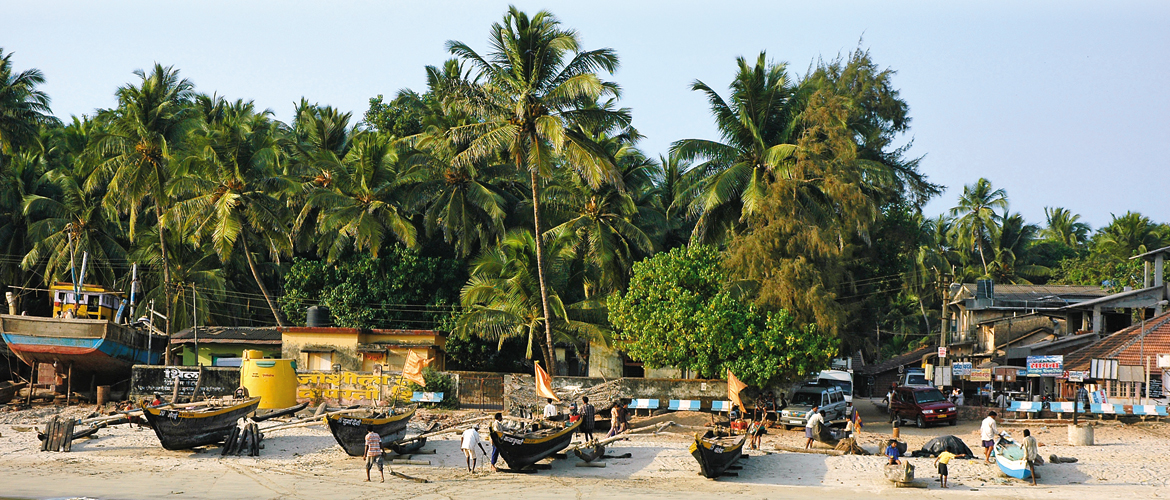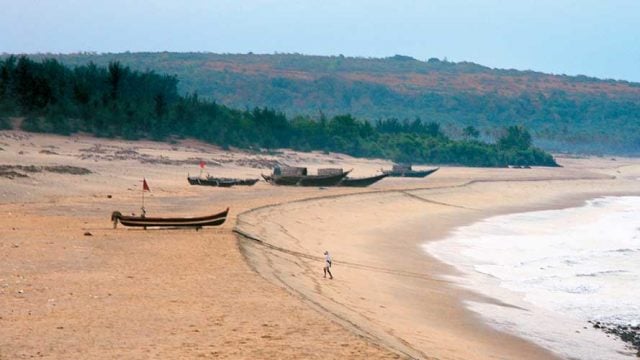Malvan was a small fishing hamlet, just one of the many on the Konkan coast, before the
One could say that the island’s natural advantages, its rocky outcrop and its reef-blocked harbour were ideal for fortification. But building a fort while fighting the Mughals and British simultaneously, that too in just three years, seems a daunting task even now.
It is believed that over 15,000 tons of iron was used in the castings and that its foundation stone was laid in lead. And as if this wasn’t enough, the Marathas under Shivaji are also believed to have fortified the nearby island of Padmagad and built a couple of forts north of Malvan town on the mainland! It was and remains an incredible achievement, and the legend of Sindhudurg’s construction has contributed as much to Shivaji’s pre-eminent position in Maharashtrian consciousness as the victories he pulled off against the Great Mughals and the Bijapur rulers.
It’s a pity that not much is known about Maratha naval prowess except for the accounts of the British who largely viewed them as ‘pirates’. If in 1765 the Maratha navy boasted of 85 frigates, that would have spelt more than ‘piracy’ to the British! Imagine, what Malvan Bay must have looked like then — filled with ships and war cries. Around the turn of the 18th century, one Maratha king and his navy was putting the fear of God into the English and the Portuguese. Malvan is where you can turn the pages of history for a glimpse of those historic clashes.

Today, Malvan’s waters are home to fishermen once again. The coast is quiet, pristine and amazingly beautiful. When the white sands squeeze through your toes on Tarkarli Beach, you can forgive yourself for letting go of the memory of warrior-kings, and slipping into a reverie fortified only by a glass of chilled beer.
Things to See & Do
To focus on Sindhudurg Fort alone would be doing an injustice to Malvan’s many other charms. Like the long, unspoilt stretches of sand, the clear inviting waters, the clamour of fishing boats returning after a day’s catch. Imagine the spread to be had, the prawns, the crabs, the sol kadi, the riches of Malvani cuisine.
Tarkali Beach
If ever the cliché ‘pristine’ was appropriate for a beach, this is it. Located 7km south of Malvan, at the confluence of the Karli River and the Arabian Sea, Tarkarli Beach has powdery white sand. This is also one of the few stretches where one can see through crystal clear waters, almost 20 ft deep. With some luck, you may even sight some dolphins or perhaps a turtle basking in the sun.
The waters here can turn rough and treacherous, so it’s best to swim only on the advice of local fishermen.
South of Tarkarli is Deobagh village, a good place to hire a boat and drift along the river. Don’t miss a houseboat cruise along the Karli backwaters. Contact MTDC for details.
Other Beaches
The Malvan Beach and the jetty—where most fishermen anchor their boats—buzz with life. In case you’re there between 5 and 7 pm, take the rare opportunity of witnessing the fish auction! Buy yourself some and have it cooked at one of the many bars or restaurants here. Alternatively, try the lovely fare at the friendly eating joint, Khot.
In contrast, Chivla Beach, bordering Malvan town to the northwest, is a tiny stretch of clean sands and clear waters that offers, happily enough, an opportunity to laze and watch the sun go down. Try the local fish at Silver Sands, a small restaurant here. Further down, Asra Mahal Beach has a modest government rest-house from where one can watch the sea from a distance sitting on a low wall. Finally, there are Tandavali (19 km), a perfect sandy beach without a soul in sight, and Achara, ideal for dolphin-spotting between October and February.
Private taxis are few and autos expensive. There’s no scooter service either, so bring your own wheels
Taxi fare ₹8-12 per km (negotiate the rate)
Sindhudurg Fort
Just half a kilometre off the mainland is this enduring testimony of Maratha power. The story goes that having chosen the site after his inability to wrest Janjira Fort from the Sidis, Shivaji named it Shivdurg after himself.
It was built on a rock-island known as Kurte Bet. Beginning 1664, over 6,000 masons, blacksmiths and labourers toiled for over three years to build it. It has: 3 km of zigzagging ramparts, 12-ft thick and 30-ft high walls, 53 bastions and 32 broad semicircular formations crowning its head. These towers have embrasures for cannons. Above the fort’s towering entrance are imprints of Shivaji’s hands and feet. Inside are temples dedicated to Mahadeo, Jarimai, Mahapursh and Bhavani and hutments of a few families claiming to be the descendants of Shivaji’s servants.
But the most unique temple here is the one dedicated to Shivaji, the Shree Shivchhatrapati Temple, the only temple where the Maratha hero is worshipped. His idol is an unusual one— a non-bearded, silver-capped image. On its lap is a sword — symbolically the Bhavani. The original fell into British hands after the Raigarh Fort fell in 1818. The temple was built by his son Rajaram in 1695 after his father’s death, and has become a pilgrimage of sorts for Shivaji’s many followers.
The Fort Conservation Trust runs ferries to Sindhudurg from the Malvan jetty. Boatmen double up as guides (at no extra charge). Go at sunset, when the view from the fort is breathtaking. Entry Free Timings 8 am-5 pm Ferry ₹45, round trip
Shopping
You can pick up cashew nuts (₹400 per kg) from Zantye near Malvan Beach. Also, buy the famous alphonso mangoes grown in these parts. The village of Katta is known for its interesting china clay pottery. It’s 30 km (1 hr) from Malvan, but the pots are worth the trip. Made of red china clay (called Chira) dug from local mines, they cost between ₹25 and 100, ranging from small diyas to 2-foot urns.
The buzzing heritage city of Sawantwadi is famous for its lacquer furniture, toys and Ganjifa cards. For wooden toys here, go to the Kanekar shop in Chitrali Lane.
Where to Stay
MALVAN
Hotel Sagar Kinara (Tel: 02365-252264; Tariff: ₹2,650-4,000), near Malvan jetty, is affordable and clean, has a bar and a restaurant that serves Malvani food. Om Shradda (Tel: 252727; Tariff: ₹800-1,500), is near the bus stand. Meals are sold nearby. Abhiruchi Resort (Tel: 253156; Tariff: ₹1,400-2,000), near the MTDC office, offers basic amenities.

TARKALI
The MTDC Holiday Resort (Tel: 02365-252390; Tariff: ₹1,400-3,600) is quite popular, so book in advance. It has 20 rooms on the beach, and a houseboat that can host a group of four. Apoorva Resort (Tel: 253920; Tariff: ₹600-800) close by serves Malvani food on order.
KANKAVALI
You can also choose to stay in Kankavali (47 km) or Kudal (42 km), which have more comfortable hotels. A luxurious option in Kankavali is Neelam’s Countryside Hotel (Tel: 02367-233409; Tariff: ₹2,500-4,000), on the national highway, and Hotel Anant (Tel: 232156; Tariff: ₹500-900).
KUDAL
The Sunikhi Lodge (Tel: 02362-221387; Tariff: ₹500-900) is a nice rest house located away from the bustle of the town and has a lovely lawn.
Where to Eat
Malvani cuisine is distinct. The use of a local fruit, kokum (garcinia), and a hint of coconut is all that the deep-coloured gravy and bright fish curries need. Mackerel, kingfish, prawns and pomfret are preferred and eaten mostly boiled.
There are more than 50 recipes for mackerel alone; the more popular of these are trifalancha, kalputi and dabdabeet. Then there is chamchamit masali tikhle (a combination of mackerel and pomfret), zanzanit kombdi suke (dry chicken), kolambi fry (prawns), mori, kalva and tisryachi suke (varieties of fish and shellfish). An average fish thali would include fish curry, rice, vegetables, roti and sol kadi.
A popular eatery in Malvan town, Chaitanya is a bit expensive but the food is wonderful. Also, do go to Arun Bhojanalaya and Bamboo House. At Tarkarli Beach, don’t miss rava-fried bangada, kukurit bombil, zanzanit kekra, tisryachi kodi and chamchamit kekdyacha masala at the thatched-roof Sapan Restaurant. You could also dine under the blue-and-white canopies of MTDC’s Sagar Darshan, at Gajanan’s thatched shack, or at Mithbhavkar’s residence.
Around Malvan
DEVGAD (54 km)
A Maratha naval power, which at one time boasted of 600 vessels, was concentrated around Devgad, Vijaydurg and Sindhudurg. Devgad is home to the ruins of another fort built in 1729 by Dattajirao Angre, Shivaji’s naval commander. Only ramparts of this fort remain today apart from a lighthouse erected by the British in the late 8th century.
Stop here for the famous alphonso mangoes grown in these parts between April and May. It’s available for anything between ₹300 and 500 per kilo. Steep, but worth it.
The best way to get to Devgad (11/2 hrs drive) is via Achara and Kunkeshwar (27 km). This route is much shorter than going via NH17 and the road is reasonably good.

VIJAYDURG FORT (74 km)
Vijaydurg Fort (2 hrs away) stands on the spot where a wooden fort existed earlier, said to be built by Raja Bhoj II of the Panhala Shilahar dynasty in 1193. It was rebuilt by the Bijapur Sultans in the 16th century and Shivaji added three further layers of fortifications, 27 bastions and 300 guns in 1654. Its colourful history owes much to Kanhoji Angre, who used this fort as a base to plunder European ships towards the end of the 17th century.
Massive walls hide various structures like khalbatkhanas (secret meeting rooms), bhuyaars (secret underground passages) and jaangi, 100-150 ft walls built 4 metres under the sea and designed to gain access to enemy vessels before they reached the port. Climb the round tower that rises from the highest part of the fort, from where you can view the wide expanse of the Arabian Sea.
Taxi fare Approx ₹8-12 per km via Devgad
heritage
Konkan Coast
Maharashtra



